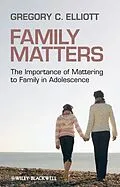Combining empirical evidence with indices to measure mattering,
Family Matters: The Importance of Mattering to Family in
Adolescence explores the inverse relationship between mattering
and dysfunctional behavior in adolescence.
* Defines mattering and distinguishes among the three ways that
people can matter to others: awareness, importance, and
reliance
* Utilizes empirical evidence from a quantitative analyses of
data from a nationwide survey 2,004 adolescents to support
author's assertions
* Explores the impact of structural and demographic factors such
as family structure in developing of a sense of mattering in
adolescents.
* Includes helpful indices, including his Mattering Index and
Rosenberg's Self-Esteem Index
* Suggests how parents, teachers, and other significant people in
the lives of adolescents can work to instill a sense of mattering
in those under their care
Autorentext
Gregory C. Elliott is Associate Professor of Sociology at Brown University. A social psychologist, his research focuses on the self and its relation to social systems. He teaches courses in social psychology, the self and society, and methods and statistics. He is a member of the American Psychological Association and the American Sociological Association. He has also been a Consultant for the National Institute for Child Health and Human Development. He has published numerous articles on mattering and the self in leading social psychology journals such as Social Psychology Quarterly and the Journal of Personality and Social Psychology.
Klappentext
Mattering--the sense that one makes a difference in the lives of others--is the most powerful motivator within the self-concept. Mattering is a fundamental safeguard that makes people aware of their connections to the larger social order; it gives evidence that we are integrated into society, and are free to pursue our goals knowing that we are not alone. The motivational impact of mattering is particularly pronounced in adolescence. During this time of personal upheaval, it is especially important to know that one matters to others; this knowledge serves as an anchor in this developmental stage of life.
In this book, Gregory Elliott explores the effects of mattering to one's family on adolescent behavior. He presents evidence that those who feel that they matter to their families are much less likely to engage in anti-social or self-destructive behaviors and suggests how parents, teachers, and any significant others can help instill a sense of mattering in the lives of adolescents in their care. The clear understanding that they matter will help protect young people from the threats to wellbeing that are so prevalent in adolescence and will encourage them to navigate smoothly through these difficult years.
Zusammenfassung
Combining empirical evidence with indices to measure mattering, Family Matters: The Importance of Mattering to Family in Adolescence explores the inverse relationship between mattering and dysfunctional behavior in adolescence.
- Defines mattering and distinguishes among the three ways that people can matter to others: awareness, importance, and reliance
- Utilizes empirical evidence from a quantitative analyses of data from a nationwide survey 2,004 adolescents to support author's assertions
- Explores the impact of structural and demographic factors such as family structure in developing of a sense of mattering in adolescents.
- Includes helpful indices, including his Mattering Index and Rosenberg's Self-Esteem Index
- Suggests how parents, teachers, and other significant people in the lives of adolescents can work to instill a sense of mattering in those under their care
Inhalt
Preface.
Acknowledgments.
1 What Does it Mean to Matter?.
2 Mattering Matters.
3 Researching Mattering: An Overview.
4 Mattering and Anti-Social Behavior.
5 Mattering and Self-Destructive Behavior.
6 Inducing Mattering.
Appendix: Researching Mattering: A Scientific View.
References.
Index
